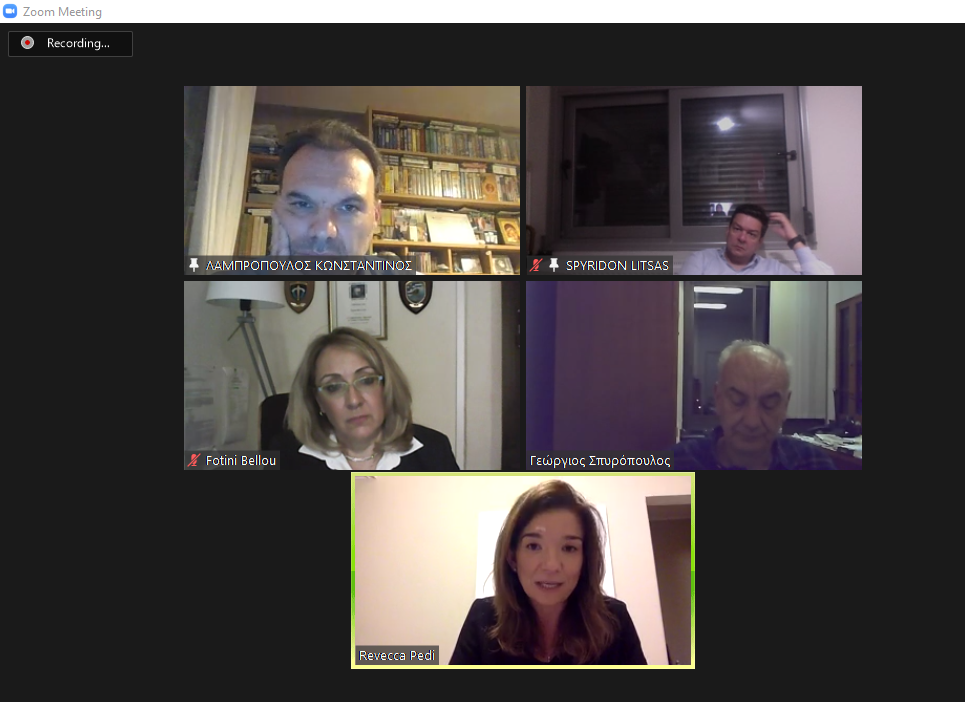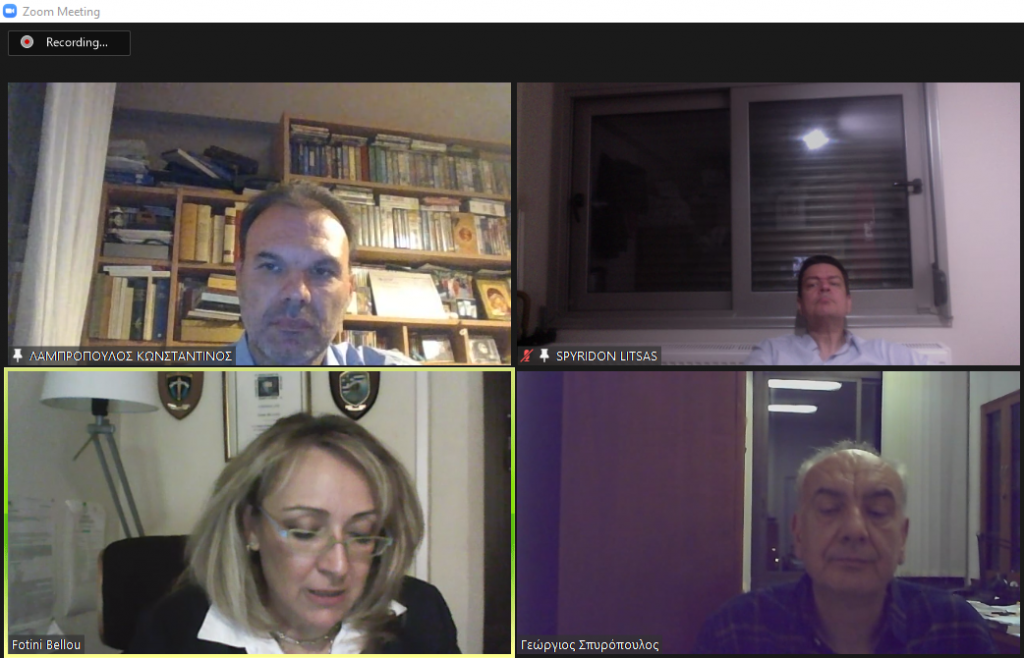Διαδικτυακό Διήμερο Συνέδριο «Άμεσοι και Ευρύτεροι Προβληματισμοί για την Ευρωπαϊκή Ασφάλεια», 13 και 14 Ιανουαρίου, 2022
Άμεσοι και Ευρύτεροι Προβληματισμοί για την Ευρωπαϊκή Ασφάλεια
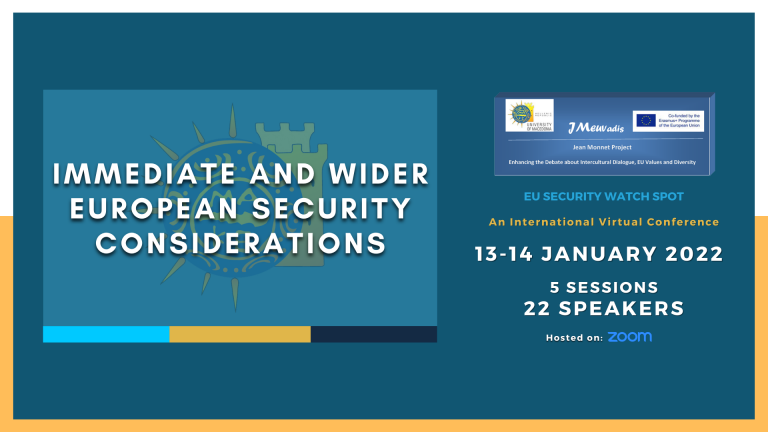
Το Παρατηρητήριο Ευρωπαϊκής Ασφάλειας, του Έργου Jean Monnet (Εrasmus+) με τίτλο «Ενίσχυση της συζήτησης για τον Διαπολιτισμικό Διάλογο, τις Αξίες της ΕΕ και την Πολυμορφία-EU VaDis» (“Enhancing the Debate about Intercultural Dialogue, EU Values and Diversity-EUVaDis”), στο Τμήμα Διεθνών και Ευρωπαϊκών Σπουδών του Πανεπιστημίου Μακεδονίας διοργανώνει διαδικτυακό διήμερο συνέδριο με τίτλο «Άμεσοι και Ευρύτεροι Προβληματισμοί για την Ευρωπαϊκή Ασφάλεια». Το συνέδριο θα πραγματοποιηθεί στην αγγλική γλώσσα μέσω της διαδικτυακής πλατφόρμας Zoom, τις ημέρες Πέμπτη 13 Ιανουαρίου (15:30-19:20) και Παρασκευή 14 Ιανουαρίου 2022 (16:00-20:20).
Ο Καθηγητής Ηλίας Κουσκουβέλης, Πρόεδρος του Τμήματος Διεθνών και Ευρωπαϊκών Σπουδών του Πανεπιστημίου Μακεδονίας θα απευθύνει σύντομο χαιρετισμό στις 16:00 την Πέμπτη 13 Ιανουαρίου.
Το συνέδριο θα ανοίξει, με κεντρική ομιλία, ο Στρατηγός (ε.α.) Μιχαήλ Κωσταράκος, επίτιμος Αρχηγός ΓΕΕΘΑ και πρώην Πρόεδρος της Στρατιωτικής Επιτροπής της Ευρωπαϊκής Ένωσης.
Τις πέντε θεματικές ενότητες του συνεδρίου θα συζητήσουν οι παρακάτω ομιλητές και ομιλήτριες:
Θεματική 1: Πολιτισμός και Κανόνες στις Εξωτερικές Σχέσεις της ΕΕ (13/01/2022, 16:30- 17:50)
– Kjell Engelbrekt, Καθηγητής Πολιτικής Επιστήμης, Swedish Defense University – Κωνσταντίνα Ε. Μπότσιου, Εκλεγμένη Καθηγήτρια Σύγχρονης Ιστορίας και Διεθνούς Πολιτικής, Τμήμα Διεθνών και Ευρωπαϊκών Σπουδών, Πανεπιστήμιο Πειραιώς – Ρεβέκκα Παιδή, Επίκουρη Καθηγήτρια Διεθνών Σχέσεων, Τμήμα Διεθνών και Ευρωπαϊκών Σπουδών, Πανεπιστήμιο Μακεδονίας
– Κωνσταντίνος Υφαντής, Καθηγητής Διεθνών Σχέσεων, Τμήμα Διεθνών, Ευρωπαϊκών και Περιφερειακών Σπουδών, Πάντειον Πανεπιστήμιο
Θεματική 2: Εξαγωγή των Αξιών της Ένωσης στο Πλαίσιο της Εξωτερικής Πολιτικής της ΕΕ (13/01/2022, 18:00-19:20)
– Δρ. Κωνσταντίνος Μπαλωμένος, Γενικός Διευθυντής, Διεύθυνση Πολιτικής Εθνικής Άμυνας και Διεθνών Σχέσεων, Υπουργείο Εθνικής Άμυνας
– Imankalyan Lahiri, Καθηγητής, Τμήμα Διεθνών Σχέσων, Jadavpur University, India – Παναγιώτα Μανώλη, Επίκουρη Καθηγήτρια Πολιτικής Οικονομίας Διεθνών Σχέσεων, Τμήμα Πολιτικής Επιστήμης και Διεθνών Σχέσεων, Πανεπιστήμιο Πελοποννήσου – Διονυσία Τσολάκη, Υποψήφια Διδάκτορας, Τμήμα Διεθνών και Ευρωπαϊκών Σπουδών, Πανεπιστήμιο Μακεδονίας
Θεματική 3: ΕΕ και Μεσόγειος — Εμπειρία του Παρελθόντος και Μελλοντικές Προκλήσεις (14/01/2022, 16:00-17:20)
– Δρ. Daniel Beaudoin, Executive Director, International Society for Military Ethics in Europe
– Αλέξανδρος Μαλλιάς, Πρέσβης επί τιμή
– Κωνσταντίνος Τζανετάκος, Υποσμηναγός, Ελληνική Πολεμική Αεροπορία – Κωνσταντίνος Ζάρρας, Εκλεγμένος Επίκουρος Καθηγητής, Τμήμα Διεθνών και Ευρωπαϊκών Σπουδών, Πανεπιστήμιο Μακεδονίας
Θεματική 4: Πολιτισμική Συνείδηση στις Αποστολές και Επιχειρήσεις τις ΕΕ (14/01/2022, 17:20-18:40)
– Καλλιόπη Χαΐνογλου, Επίκουρη Καθηγήτρια Διεθνούς Δικαίου, Τμήμα Διεθνών και Ευρωπαϊκών Σπουδών, Πανεπιστήμιο Μακεδονίας
– Ευαγγελία Κιόση, Αντισυνταγματάρχης, Υποδιοικήτρια του Κολλεγίου του Νομικού Σώματος, Γενικό Επιτελείο Εθνικής Άμυνας
– Φωτεινή Μπέλλου, Επίκουρη Καθηγήτρια Διεθνών Σχέσεων, Τμήμα Διεθνών και Ευρωπαϊκών Σπουδών, Πανεπιστήμιο Μακεδονίας, Επικεφαλής του Παρατηρητηρίου Ευρωπαϊκής Ασφάλειας, Έργο Jean Monnet “EUVadis”
– Ιωάννης Πατέρας, Ταξίαρχος (ε.α.) Υποψήφιος Διδάκτωρ, Τμήμα Διεθνών και Ευρωπαϊκών Σπουδών, Πανεπιστήμιο Μακεδονίας
Θεματική 5: Θρησκεία, Τρομοκρατία και ο Νέος Φονταμενταλισμός (14/01/2022, 18:50- 19:50)
– James Gow, Καθηγητής Διεθνούς Ειρήνης και Ασφάλειας, Department of War Studies, King’s College London
– Βασίλειος Κουτσολιάκος, Αστυνομικός Υποδιευθυντής, Ελληνική Αστυνομία – Arthur Atanesyan, Καθηγητής, Πρόεδρος του Τμήματος Εφαρμοσμένης Κοινωνιολογίας, State University of Armenia
– Χρήστος Νίκας, Καθηγητής Διεθνών Οικονομικών Σχέσεων και Οικονομικής Ολοκλήρωσης, Τμήμα Διεθνών και Ευρωπαϊκών Σπουδών, Πανεπιστήμιο Μακεδονίας
Επισυνάπτεται το αναλυτικό πρόγραμμα του συνεδρίου.
Η εκδήλωση θα διεξαχθεί στην αγγλική γλώσσα και δεν θα υπάρχει διερμηνεία.
Η παρακολούθηση του συνεδρίου είναι δωρεάν και η πρόσβαση σε αυτό θα γίνει μετά από εγγραφή στον παρακάτω σύνδεσμο:
https://zoom.us/meeting/register/tJclfu2vrzwrGtXTp8ARqXbMWV8h-VyIPGW7
Μετά την εγγραφή των ενδιαφερόμενων στον παραπάνω σύνδεσμο, οι ενδιαφερόμενοι/ες θα λάβουν στην ηλεκτρονική διεύθυνση ταχυδρομείου (email) με την οποία πραγματοποίησαν την εγγραφή τους το σύνδεσμο μέσω του οποίου θα παρακολουθήσουν την εκδήλωση. Ο σύνδεσμος είναι ο ίδιος και για τις δύο ημέρες.
Οι συμμετέχοντες/ουσες στην εκδήλωση θα λάβουν βεβαίωση παρακολούθησης μέσω ηλεκτρονικού ταχυδρομείου (email) στην ηλεκτρονική διεύθυνση ταχυδρομείου με την οποία πραγματοποίησαν την εγγραφή τους.
Περισσότερες πληροφορίες μπορείτε να βρείτε στην ιστοσελίδα του προγράμματος: https://jmpeuvadis.uom.gr ή στη σελίδα του προγράμματος στο Facebook https://www.facebook.com/JMP.EUVaDis/. Για τυχόν ερωτήσεις και περισσότερες πληροφορίες επικοινωνήστε μαζί μας στη διεύθυνση ηλεκτρονικού ταχυδρομείου: jeanmonnetproject-euvadis@uom.edu.gr.
«Πτυχές των υβριδικών απειλών ασφάλειας εντός της ΕΕ και της ευρύτερης περιοχής της» – 21 Ιανουαρίου, 2021
Τρίτη Διάλεξη του Παρατηρητηρίου για την Ασφάλεια στην ΕΕ
«Πτυχές των υβριδικών απειλών ασφάλειας εντός της ΕΕ και της ευρύτερης περιοχής της»

The EU Security Watch Spot, unit of the Jean Monnet Project “Enhancing the Debate about Intercultural Dialogue, EU Values and Diversity”, Department of International and European Studies, University of Macedonia, organized its third online Guest Lecture Event entitled “Aspects of Hybrid Security Threats Within the EU and its Wider Vicinity” on the 21st of January 2021.
The Welcome Speech was delivered by Professor Ιlias Kouskouvelis, Head of the Department of International and European Studies of the University of Macedonia, who stressed the importance of examining and discussing the different aspects of security and highlighted the need to critically evaluate ideas and concepts in order to enhance academic debate and clarity.
Dr. Ofer Fridman, Guest Speaker of the event, Lecturer in War Studies at King’s College, London, UK, elaborated on the nature of hybrid threats in the European context while his critical perspective sparked considerable and much-needed debate among the online attendees. Academics and subject matter experts had the opportunity to analyze various aspects of security challenges facing the E.U. More specifically, Dr. Konstantinos Lambropoulos, Associate Fellow in the Geneva Centre for Security Policy, focused on the regional perspective of hybrid threats in East Mediterranean, followed by Professor Dimitrios Triantaphyllou from Kadir Has University in Istanbul, who made an in depth analysis on the security considerations in the wider E.U. region, while Mr. Michalis Mathioulakis, Academic Director at the Greek Energy Forum and Ph.D. Candidate at the Department of International and European Studies of the University of Macedonia, addressed the energy sector as an area of security considerations for regional powers in East Mediterranean. The discussion was moderated by the Head of the EU Security Watch Spot, Assistant Professor Fotini Bellou.
The Guest Lecture Event was attended by more than 240 participants consisting of university students, military personnel, and subject matter experts from Greece and abroad. The active discussion that followed in the Q&A session revolved around the conviction, shared by speakers and participants, about the need for continued research not only on the character of events that challenge E.U. security, but also on the wider strategic context in which these events take place. Moreover, the importance of enhancing the response capabilities of E.U. Member States was stressed in the discussion. Speakers and participants shared the view that the multifaceted character of threats currently facing the E.U. requires well-coordinated responses as well as a unified purpose to address those threats effectively. Yet, it was acknowledged that such conditions are still pending from the E.U., which still struggles to defend its own strategic identity.
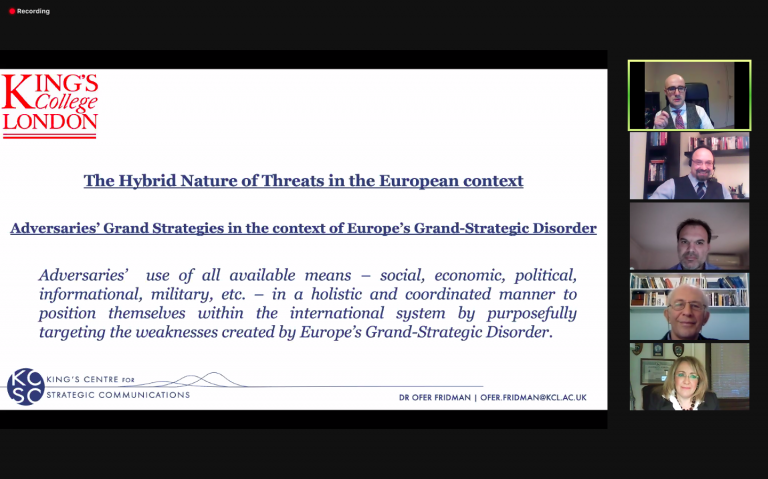
“Women in Diplomacy” – 16 Δεκεμβρίου, 2020
Δεύτερη Διάλεξη του Παρατηρητηρίου για την Ασφάλεια στην ΕΕ
"Women in Diplomacy”
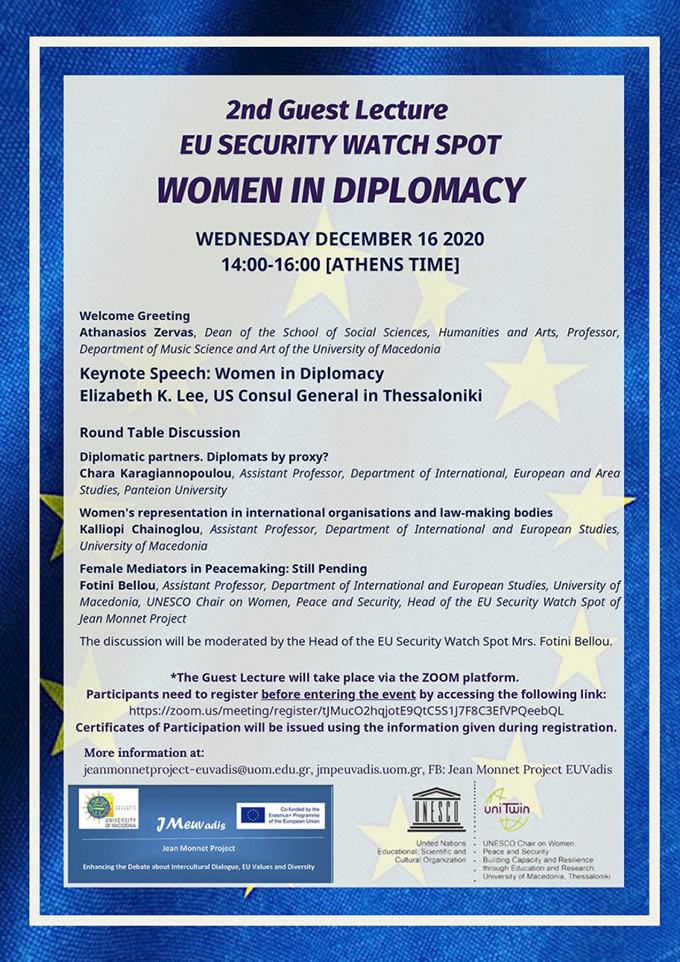
The EU Security Watch Spot of the Jean Monnet Project “Enhancing the Debate about Intercultural Dialogue, EU Values and Diversity”, Department of International and European Studies – University of Macedonia, successfully organized its second online Guest Lecture Event entitled “Women in Diplomacy”, on 16nth of December 2020. The Event was conducted in collaboration with the UNESCO Chair “Women, Peace and Security: Building Opportunities and Resilience through Education and Research” of the University of Macedonia.
The Welcome Greeting was delivered by the Dean of the School of Social Sciences, Humanities and Arts of the University of Macedonia, Professor Athanasios Zervas, Department of Music Science and Art, who not only stressed the importance of women in diplomacy but also emphasized on the attendance at the conference of distinguished guests who promote female representation.
The Keynote Speaker, Ms. Elizabeth K. Lee, U.S. Consul General in Thessaloniki, elaborated on the role that women have portrayed in U.S. diplomacy over the years. The subject was thoroughly discussed by academics from the Departments of International, European and Area Studies of the Panteion University and International and European Studies of the University of Macedonia, at the roundtable discussion that followed. More specifically, Assistant Professor Chara Karagiannopoulou focused on the role of women as diplomatic partners, followed by Assistant Professor Kalliopi Chainoglou who presented the lack of extensive female representation in international organizations and law- making bodies. The concluding remarks were addressed by Assistant Professor Fotini Bellou, Head of the EU Security Watch Spot and Director of the UNESCO Chair, who highlighted the need of female mediators’ representation in all stages of peacemaking procedures.
The successful event was attended by more than 130 university students, military personnel and subject matter experts who also had the opportunity to take part in the discussion that followed, in which subjects such as the importance of the continued efforts for more inclusivity to the foreign policy bodies and a more extensive female representation in all spheres of policymaking were highlighted; the significance of the promotion of the Women, Peace and Security Policy Agenda, in light of the 20th anniversary of the fundamental U.N. Security Council Resolution 1325 was equally emphasized during the aforementioned discussion with the audience.
«Σύγχρονα θέματα ασφάλειας στο Ευρωπαϊκό περιβάλλον, Αναθεωρητισμός, Ταυτότητες, Ασύμμετρες απειλές και σχέσεις ισχύος» – 23 Οκτωβρίου, 2020
Πρώτη Διάλεξη του Παρατηρητηρίου για την Ασφάλεια στην ΕΕ
«Σύγχρονα θέματα ασφάλειας στο Ευρωπαϊκό περιβάλλον,
Αναθεωρητισμός, Ταυτότητες, Ασύμμετρες απειλές και σχέσεις ισχύος»
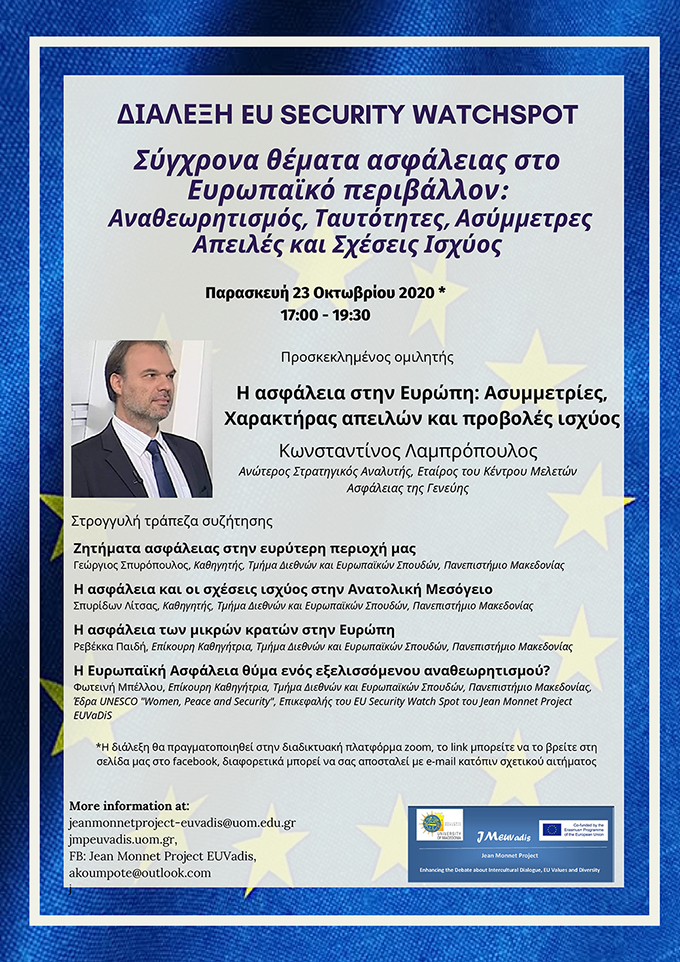
The EU Security Watch Spot of the Jean Monnet Project “Enhancing the Debate about Intercultural Dialogue, EU
Values and Diversity” of the Department of International and European Studies of the University of Macedonia
organized with great success its first virtual Guest Lecture Event, on “Contemporary security issues in Europe:
Revisionism, Identities, Asymmetric Threats and Power Relations” on 23rd of October 2020.
The Keynote Speaker was Dr. Konstantinos Lambropoulos, Senior Strategic Analyst and Partner of the Geneva
Center for Security Studies, who spoke about security in Europe, asymmetric threats and power projections. A
roundtable discussion followed with a number of academics from the Department of International and European
Studies who discussed various angles of international security. More specifically, Professor Georgios M.
Spyropoulos focused on the extended nature of international security, Professor Spyridon M. Litsas discussed
security and power in the Eastern Mediterranean as well as notions related to climate change and their effect on
security, Assistant Professor Revecca Pedi, presented security issues of small states of the European Union, and,
finally, Assistant Professor Fotini Bellou, Head of the EU Security Watch Spot, looked at the conditions under which
European security has become the victim of an evolving revisionism.
The event was organized in Greek and was attended by more than 300 university students, military personnel and
subject matter experts. The discussion that followed with the audience highlighted the importance of key EU policy
areas, such as security and defence. It also emphasized the need for continued academic interest and research in
order clarify a number of uncertainties and to shed light on the important questions pertaining European security
